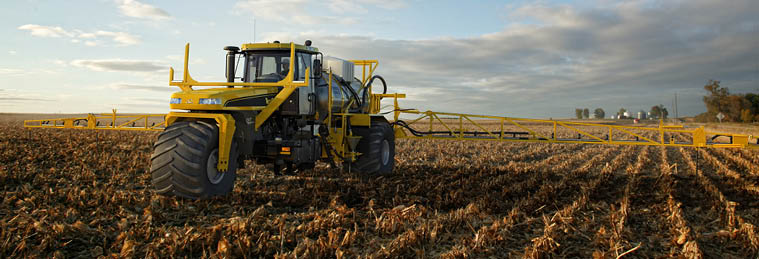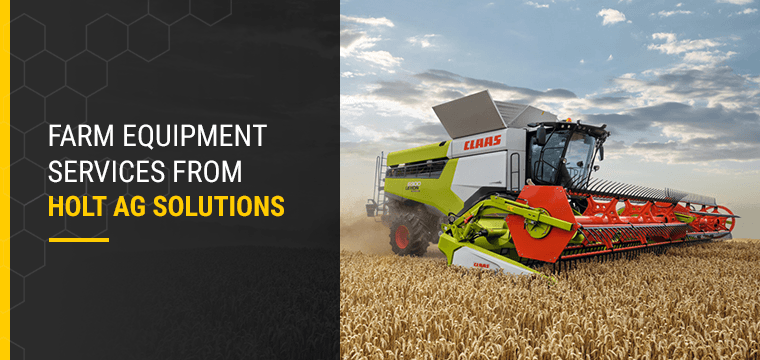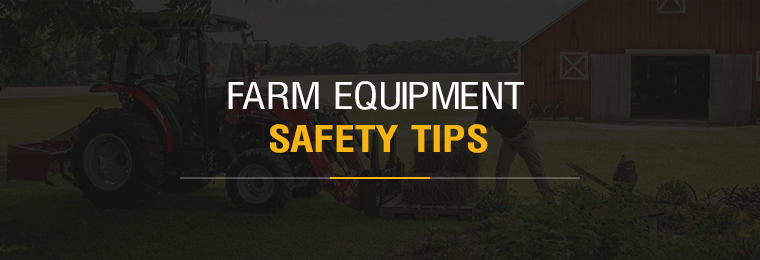
Quick Navigation:
- Importance of Farm Equipment Safety Principles
- Top Farm Equipment Safety Rules and Tips
- Farm Equipment Road Safety Tips
When you want to keep your farm running efficiently and safely, you'll need to implement a few safety best practices. Since farm equipment can be dangerous when improperly operated, farm equipment safety standards are some of the most important standards you can implement. With an understanding of proper farm equipment safety tips, you can better protect your staff from injuries and machinery from damages that lead to downtime.
Find out more about the importance of farm equipment safety standards and some of the top farm equipment safety tips for use on the road and in the field.
Importance of Farm Equipment Safety Principles
Given the type of work and machines farming requires, it can be a dangerous profession. One of the biggest causes of accidents on a farm is the improper use of equipment. Since farmers want to keep their operators and employees as safe as possible, following the best safety practices when using farming tools and equipment is crucial.
Proper safety principles can help lower the risk of injuries and protect your equipment from damage. They can also keep your business more productive, as you'll reduce downtime due to operator injury or machines needing repairs. Additionally, having farm equipment safety standards in place can help you avoid federal or state government fines due to noncompliance.
Top Farm Equipment Safety Rules and Tips
Learn more about the top safety practices in using farm tools and equipment below:
1. Follow State and Federal Laws
Since heavy-duty farm equipment can lead to major injuries when used improperly, several state and federal laws govern their use. To operate your equipment safely and avoid fines, follow any federal and state farm equipment safety rules. Some common regulations include marking and lighting requirements for machinery, especially when operators drive equipment on public roads.
2. Review Equipment Manual
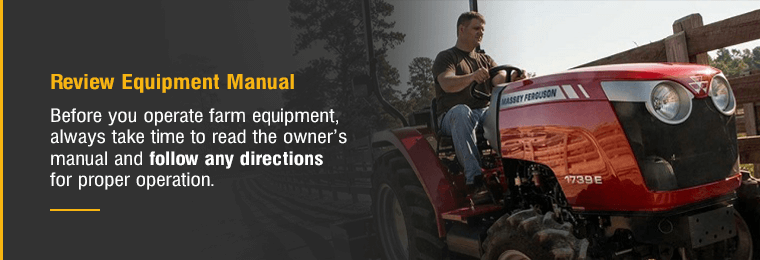
Before you operate farm equipment, always take time to read the owner's manual and follow any directions for proper operation. Even if you're used to driving a specific type of machine, like a tractor or combine, you should still review the owner's manual for any piece of equipment you add to your farm equipment fleet. A new tractor may have some major differences from your old one, so it's best to review the equipment manual and ensure you know how to operate it safely.
3. Stay Well-Rested
Heavy-duty farm equipment can do a lot of damage to operators, bystanders and property when it's not used properly. Operator fatigue is a huge source of accidents, as operators are more likely to make mistakes or even fall asleep at the wheel. If you're feeling fatigued, don't operate a piece of machinery. Get your rest first before taking the wheel.
4. Avoid Drugs and Alcohol
A single drink can impair your ability to operate machinery safely. When you're operating a piece of machinery, avoid using drugs or alcohol that could affect your judgment and lead to an accident. Stay as alert as possible by ensuring you're totally sober before operating farm equipment.
5. Adjust Equipment as Needed
Another key practice for safe use of farm tools and equipment is to adjust your equipment to your operational needs. For example, it's crucial your access doors, guards and shield are in place when you operate farm equipment. If your operational conditions change, make the needed alterations to these components to fit the new factors and keep your operators as safe as possible.
6. Wear Protective Clothing
When you're operating farm machinery, avoid wearing loose-fitting pants or shirts. These clothes can get caught in rotating machine parts and lead to injury. Instead, wear protective clothing that reduces the risk of injuries and protects an operator in an accident.
7. Equip Tractors With Roll Over Protective Structures
A roll over protective structure (ROPS) is crucial to the safe operation of tractors. Since the risk of fatalities is much higher when a tractor rolls over or flips and doesn't have a ROPS, safety-focused businesses outfit their tractors with them. When you're looking for new tractors, see if they're already outfitted with a factory-installed ROPS. If you have a piece of older equipment, invest in a ROPS to better protect your workers.
Farm Equipment Road Safety Tips
When you're taking your farm equipment on the road, it's important to keep yourself, any passengers and other motorists sharing the road safe. Below are some of the top road safety tips for farm equipment:
- Ensure your equipment is visible: Whether you're taking a compact tractor or a large spreader out on the road, your equipment should be highly visible to other motorists. Before you drive heavy machinery on the road, verify its flashers and lights work appropriately. Equipment should also have reflective tape on it. Drivers need to employ warning lights, flashers and flags to indicate they're operating a slow-moving piece of machinery.
- Familiarize yourself with roads and the best times to travel on them: Since farm equipment tends to be larger and harder to handle than everyday vehicles, it's important you verify it can safely travel on the roads you're planning to take. Pay particular attention to narrow bridges, low overhangs, loose gravel, soft shoulders and deep ruts. It's also best to avoid traveling during heavy traffic times.
- Be aware of your farm vehicle's size: Since farm equipment is usually larger than personal vehicles, keep the size in mind when you're driving around other motorists and on public roads. When you're driving a large piece of machinery, you'll want to avoid overhead obstacles, like low bridges and power lines. If you're towing equipment, ensure your vehicle can also safely carry the large load and that whatever you're hauling can fit under any overhead obstacles.
- Obey traffic laws: While obeying traffic laws might seem obvious, some operators don't realize it when operating a piece of machinery on the road. As you drive your farm equipment, ensure you're following all traffic laws like you would when driving your personal vehicle for optimal farm equipment highway safety.
Turn to Holt Ag Solutions for Your Farm Equipment Needs
Now that you've familiarized yourself with safety measures in using farm tools and equipment, you can feel prepared when investing in new farm equipment. At Holt Ag Solutions, we're proud to offer a wide inventory of safe and reliable farm equipment. Alongside our high-quality offerings, we also offer exceptional customer support. We can provide servicing and parts for all your machines, and our knowledgeable staff is always ready to provide any assistance you require.
Browse our new agricultural equipment today, and contact us if you have any questions.


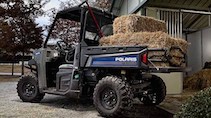 Farm Tax Exemption Form
Farm Tax Exemption Form